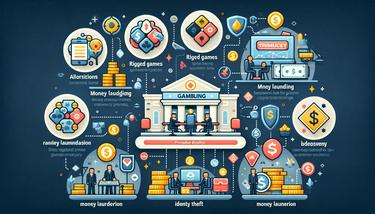What types of fraud and violations most often occur in the gambling industry?
The gambling industry is susceptible to various types of fraud and violations, including identity theft, bonus abuse, payment fraud, software manipulation, and the use of insider information. Such activities not only undermine the integrity of gambling operations but also pose significant financial and reputational risks to operators.
Key Facts
- Identity theft and bonus abuse.
- Payment fraud and software manipulation.
- Use of insider information to influence gambling outcomes.
The gambling industry, with its significant cash flow and sometimes complex regulatory environments, can be susceptible to a range of fraudulent activities and regulatory violations. These activities not only undermine the integrity of the gambling sector but also pose significant risks to consumers and businesses alike. Understanding the most common types of fraud and violations in the gambling industry is crucial for stakeholders to implement effective countermeasures and for regulatory bodies to ensure a fair and secure gambling environment.
Identity Theft and Account Fraud
One of the most prevalent forms of fraud in the gambling industry involves identity theft and account fraud. Fraudsters often use stolen identities to create or take over gambling accounts. This allows them to play with money obtained illegally, launder money, or withdraw funds from compromised accounts. The anonymity[1] provided by online platforms can make it particularly challenging for operators to verify the identities of their customers, despite stringent know-your-customer (KYC) and anti-money laundering (AML) regulations.
Bonus Abuse
Bonus abuse is a common issue in the online gambling[2] sector, where individuals exploit signup bonuses, free bets, and other promotions. By creating multiple accounts or using loopholes in the terms and conditions of promotions, abusers can unfairly benefit at the expense of the gambling operator. This not only leads to financial losses for companies but also undermines the fairness and integrity of gaming operations.
Payment Fraud
Payment fraud is a significant concern, involving stolen credit cards, chargeback abuses, and the use of counterfeit money in physical casinos. In online settings, fraudsters may use stolen credit card information to fund gambling accounts, later disputing the charges to have them reversed. Chargeback fraud, particularly, can be costly for operators and can lead to higher processing fees and banking restrictions.
Match-fixing and Cheating
Match-fixing involves manipulating the outcome of a game or event to secure a predetermined result, usually for the benefit of bettors in on the scheme. Cheating can also occur within casinos, involving collusion between players and dealers, use of prohibited devices, or exploitation of game vulnerabilities. These activities not only affect the fairness of the games but also damage the reputation of the industry.
Money Laundering
The gambling industry can be an attractive venue for laundering illegally obtained money. The process typically involves depositing money into a gambling account, gambling minimally, and then withdrawing the funds, which now appear as legitimate winnings. Online platforms, with their global reach and sometimes less stringent regulatory oversight[4], can be particularly vulnerable to such schemes.
Regulatory Violations
Beyond fraud perpetrated by individuals or groups, gambling operators themselves may sometimes engage in or be accused of regulatory violations. This can include operating without a license, offering gambling services to minors or in jurisdictions where gambling is prohibited, failing to adhere to responsible gambling[5] practices, or not complying with AML and KYC[6] regulations. Such violations can lead to hefty fines, legal action, and damage to an operator’s reputation.
Understanding and addressing these types of fraud and violations are paramount for the gambling industry to protect its customers, ensure compliance[7] with regulations, and maintain the integrity and trustworthiness of its operations. Continuous efforts in improving security measures, regulatory compliance[8], and customer education are essential in mitigating these risks.
- Anonymity — The ability to maintain privacy over transaction and identity details within cryptocurrency transactions.
- Online Gambling — The provision of gambling services through the internet, including online casinos, sports betting, and virtual slot games.
- Money Laundering — The process of making large amounts of money generated by a criminal activity appear to be legally obtained.
- Regulatory Oversight — The supervision by authorities to ensure that market participants comply with legal and ethical standards.
- Responsible Gambling — Initiatives and practices aimed at promoting safe and controlled gambling, preventing gambling addiction, and protecting vulnerable players.
- AML and KYC — Anti-Money Laundering and Know Your Customer regulations aimed at preventing financial crimes by verifying the identity of clients.
- Compliance — The act of adhering to legal standards and regulations established by governmental bodies and regulatory agencies, particularly in the context of financial operations and transactions involving cryptocurrencies.
- Regulatory Compliance — Adherence to laws, regulations, guidelines, and specifications relevant to business processes.
- Gambling Commission. 'Fraud and Risk Management.'
- eCOGRA. 'Safe and Fair Seal Principles.'

